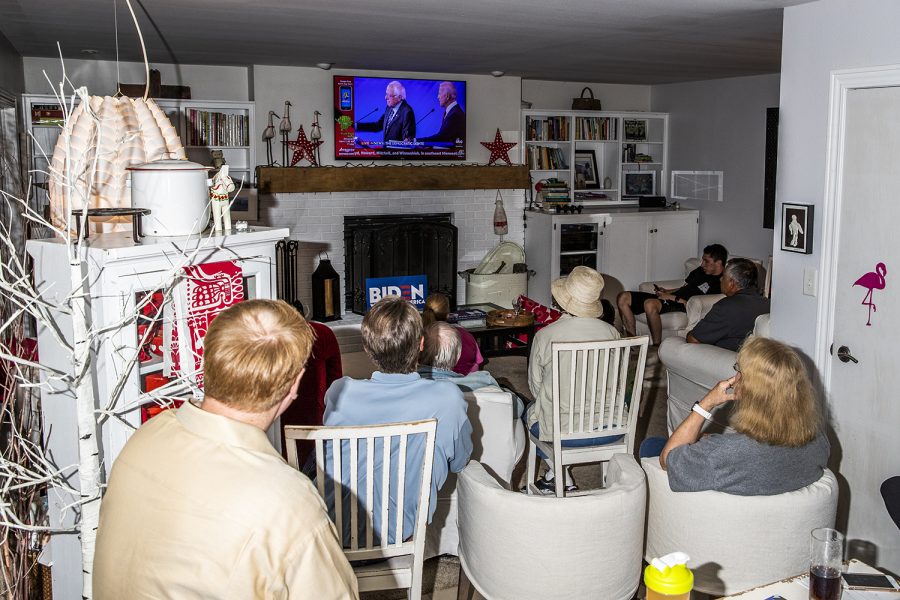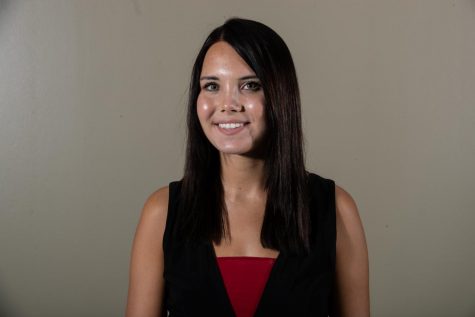Opinion: 20 Out of 20: Winners and losers of the third Democratic debate
Supporters listen during a watch party for former Vice President Joe Biden on Thursday, September 12, 2019. Biden emphasized his support for expanding the Affordable Care Act as opposed to Medicare for All. (Katina Zentz/The Daily Iowan)
September 13, 2019
That’s three down, and way too many to go.
The third debate in the Democratic presidential-nomination race took place Thursday night. With 10 candidates on the stage, some clearly did more than others to help their chances of becoming their party’s pick to face President Trump next year.
Winner: Joe Biden
Biden’s biggest priority of the night was to not screw up, and for the most part, he did that. The former vice president leads in almost every poll and is currently the most likely to win the nomination. The key to keep that top spot: maintain the status quo.
While he wasn’t the most stellar, Biden performed better than in previous debates. The “scrappy kid from Scranton” was noticeably sharper and more sure of himself when speaking.
He still isn’t running away with the party nod, but Biden is getting closer.
Winner: Beto O’Rourke
Personally, I had written off the former Texas congressman. What once looked like a high-flying campaign for O’Rourke — who rose to national prominence in 2018 thanks to his charisma and energy — had flickered down to the low single-digits in the polls. But at least for one debate, the old O’Rourke came back.
He spoke forcefully on issues such as gun control and race relations. He was articulate without seeming scripted. It didn’t hurt that the debate was held in his home, Lone Star State.
We’ll see if O’Rourke actually mounts a substantive comeback, but if he is to become relevant again, this is how it starts.
Loser: Bernie Sanders
First of all, it appears the independent Vermont senator had a bit of a cold, giving his Brooklyn accent even more distinction. But Sanders has more issues on optics than just a raspy tone of voice.
Someone would have to do something truly extraordinary for an outspoken socialist to rise to the top of the Democratic Party. This debate was a chance for him to re-emerge, and nothing he said really accomplished that.
Instead of expanding his message to include more people in his left-wing coalition, Sanders just repeated the same lines from his stump speech about stagnant wages and the need for programs such as Medicare-for-All. While understandable, that strategy won’t help him pick up the additional primary support he needs.
Winner: Elizabeth Warren
More so than any other candidate, Warren knows what she’s talking about. The Massachusetts senator’s reputation of having a plan for everything is justified the second she begins speaking. Rarely does she offer a vague generalization when asked a question; she’s done her homework.
Part of the reason Sanders struggles so much to broaden his support is Warren’s presence. She challenges Sanders for the left bloc of the party and is performing just as well, if not better, in terms of polling.
Looking at her debate performance, it’s clear to see why that’s the case. Put simply, she’s more persuasive to more people. Perhaps similar to Biden, she didn’t have an enormously game-changing night, but she’s heading in the correct direction.
Loser: Andrew Yang
I haven’t written much about Yang before, mostly because he hasn’t seemed all that relevant. With the debate field whittled down to 10, and with Yang still in the mix, I thought tonight could have been his breakthrough. It didn’t happen.
The entrepreneur has a bundle of big ideas, most famously his proposal for universal basic income, which would supplement Americans with $1,000 a month. In his opening statement, he announced that he will demonstrate this policy with 10 households chosen from those who apply at his campaign website.
That all happened a few minutes into the three-hour debate. It didn’t become significant later on, and Yang was fairly lackluster for the rest of the night.
















